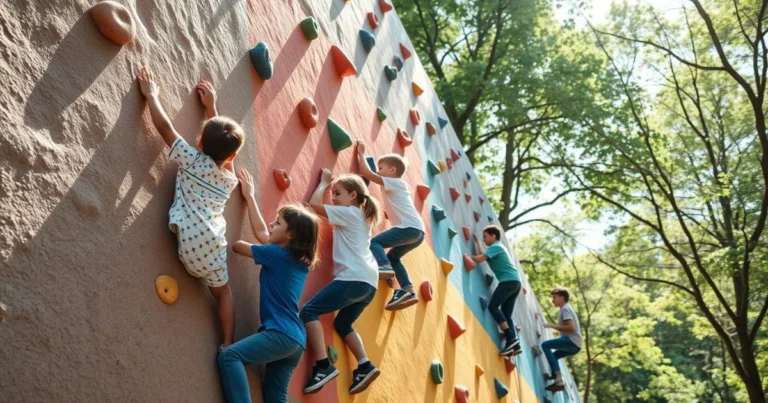From Childhood to Confidence
As a parent, you understand how important self-esteem is. It can greatly influence a child’s life, affecting their school success, career, and relationships. But where does this confidence start? It begins in childhood, when self-assurance is built, step by step.
The journey to confidence is unique and deeply personal. It’s filled with moments that inspire, challenge, and change us. This path includes encouragement, play, positive examples, and learning to face obstacles. By knowing how self-esteem grows, you can help your child build a strong sense of self-worth.

Key Takeaways
- Early encouragement lays the groundwork for self-confidence.
- Play and exploration are crucial for developing skills and self-assurance.
- Positive role models have a significant influence on confidence building.
- Overcoming challenges teaches resilience and fosters personal growth.
- Consistent emotional support creates a secure environment for confidence to thrive.
Understanding the Foundation of Self-Esteem
Building a positive self-image starts in childhood. Your early life, family, and beliefs about yourself shape your emotional intelligence, positive mindset, and resilience. Knowing where self-esteem comes from is key to lasting confidence.
The Role of Early Experiences
Studies on twins in the U.S., U.K., Finland, and Japan found genetics play a big role in self-esteem. But, 60-68% of self-esteem comes from your environment, especially in your early years.
Impact of Family Dynamics
Your environment and support systems greatly influence your growth. Abuse or neglect can hurt your self-esteem. But, a loving family can boost your self-worth.
Core Components of Self-Worth
Healthy self-esteem comes from positive feedback, facing challenges, and emotional support. Social connections are linked to better mental health and higher self-esteem.
| Factor | Percentage of Influence on Self-Esteem |
|---|---|
| Genetic | 32-40% |
| Environmental | 60-68% |
Understanding self-esteem’s foundation helps you improve your emotional intelligence, positive mindset, and resilience. This way, you can thrive.
“The way we talk to our children becomes their inner voice.” – Peggy O’Mara
From Childhood to Confidence: The Developmental Journey
Building self-belief and inner strength starts early in life. As kids grow, they face moments that shape their self-worth. This journey is key to their well-being and success.
Early experiences and encouragement are vital. Support from parents and teachers boosts kids’ self-belief. Children thrive on unconditional support, helping them grow emotionally and psychologically.
Play and exploration are also important. Through imaginative play and problem-solving, kids build confidence and essential skills. Emphasis on effort and persistence helps them see challenges as learning opportunities.
Positive role models like Oprah Winfrey and Nelson Mandela inspire many. They show the power of self-belief and inner strength. Their stories encourage others to believe in themselves and chase their dreams.
Overcoming challenges is a big part of growing up. Kids who face and solve problems learn about their inner strength. This builds their confidence and self-belief.
The path to confidence is complex but rewarding. It needs emotional support, positive role models, and chances to grow. By focusing on these, we help kids develop the self-belief and strength to succeed in life.
“Confidence is a habit that can be developed by acting as if you already have it.” – Gill Hasson
The Power of Positive Reinforcement
Building self-assurance and a positive mindset in kids starts with positive reinforcement. This method praises good actions and rewards them, not just punishing bad ones. By praising a child’s effort and progress, you help them grow and feel valued.
Effective Praise Techniques
Good praise is more than just saying “good job.” It’s about pointing out specific actions or traits you want to see more of. For instance, saying, “I saw you keep trying even when it was tough. That shows great perseverance.” This kind of praise helps kids see the value of their hard work and encourages them to keep improving.
Recognition of Effort vs. Outcome
When giving praise, focus on the effort, not just the result. Praise kids for their hard work, problem-solving, and eagerness to learn. This way, they see challenges as chances to grow, not threats to their self-worth.
Building Internal Motivation
Positive reinforcement boosts self-assurance and helps kids develop a love for learning. By praising their efforts and progress, you help them take pride in their achievements. This internal motivation is key for healthy personal growth and a lasting positive mindset.
“Positive reinforcement is the key to unlocking a child’s potential and fostering a lifelong love of learning.”
Creating a Supportive Environment for Growth
Building self-esteem in kids starts with a caring, supportive place. At BVIS HCMC, we create a safe space for students to express themselves. They can explore their interests and grow their talents.
We limit bad influences and encourage independence. This helps our students develop emotional intelligence, resilience, and strong self-belief.
Studies show confident kids do better in school. At BVIS HCMC, our diverse student body broadens their world view. This helps them succeed.
We focus on all aspects of a child’s growth. This way, they can face life’s challenges with confidence and self-worth.
We offer activities like team-building, public speaking, and project-based learning. We also celebrate their wins. These activities help them feel part of a community and ready to take on new challenges.
Positive feedback and personalized advice are key. They make sure each child feels important and supported.
“Confident people typically think ‘I can’ instead of ‘I can’t’.”
Building self-confidence is a team effort between teachers and parents. We celebrate individuality and small wins. We also focus on effort, not just results, and involve kids in household tasks.
At BVIS HCMC, we aim to support our students’ full growth. We focus on emotional intelligence, resilience, and self-belief. This prepares them for life’s ups and downs, setting them up for success.
The Role of Play in Developing Self-Assurance
In the early years, play is more than fun. It’s key for a child’s self-assurance. Through play, kids learn about themselves and the world in a safe place.
Imaginative Play Benefits
Structured play boosts learning by focusing on specific skills. It helps with thinking, feeling, and moving. Through play, kids grow their creativity and solve problems, building confidence.
Social Interaction Through Play
Play helps kids learn to work together and talk well. In group activities, they share ideas and listen, growing more confident.
Problem-Solving Development
Play sharpens thinking and decision-making. Kids solve puzzles and games together, learning to face challenges with confidence.
Play builds imagination, social skills, and problem-solving. It prepares kids for personal growth and character development later on.
Overcoming Challenges and Building Resilience
Facing and overcoming challenges is key to growing inner strength, self-belief, and personal growth. Helping children see challenges as growth opportunities is vital. This mindset helps build lasting confidence and resilience.
Studies show resilient kids handle stress and emotions better. They are less likely to feel anxious or depressed. Overcoming obstacles boosts their confidence and readiness for future challenges.
Resilience also helps kids become more independent and self-reliant. They learn to take the lead and keep going, even when it’s hard. Healthy habits like exercise, good food, and sleep are crucial for their well-being.
Exposure to nature, even just 20 minutes three times a week, is also beneficial. A holistic approach is best for building resilience. This includes physical activity, nature, relationships, sleep, and a supportive home environment. By focusing on these areas, you can help your children grow strong and resilient.
“Resilience is not something that can be taught, but rather something that can be nurtured, encouraged, and supported.” – Dr. Ann Masten, resilience researcher

Emotional Intelligence and Self-Worth
Emotional intelligence helps kids understand and manage their feelings. It’s key for their self-worth. Kids with emotional smarts feel more confident in social situations and make deeper connections.
Understanding and Managing Emotions
When kids know their emotions, they understand themselves better. This self-awareness lets them share their feelings and control how they react. It boosts their positive mindset and self-esteem.
Developing Empathy
Empathy is at the heart of emotional intelligence. Kids who are empathetic connect with others on a deeper level. They form real friendships and grow in character.
Building Healthy Relationships
Emotionally smart kids build strong relationships. They connect well with friends, family, and others. These bonds make them feel valued and part of a community.
| Impact of Emotional Intelligence | Positive Outcomes |
|---|---|
| Social Relationships | Empathy and understanding of others Positive social interactions and cooperation Development of meaningful relationships |
| Resilience and Coping Skills | Improved emotional regulation and problem-solving Ability to cope with stressors and setbacks Adaptability and resilience in the face of challenges |
| Academic Success | Enhanced concentration and focus Improved communication and collaboration skills Better academic performance |
By focusing on emotional intelligence, we help kids grow positively. They develop a strong sense of self-worth. This empowers them to succeed in every area of life.
The Impact of Role Models and Mentorship
Positive role models and mentors greatly influence self-assurance, personal growth, and character. Figures like J.K. Rowling and Malala Yousafzai inspire with their resilience and confidence. They show kids and teens that they can overcome challenges and achieve their dreams.
Mentorship provides personalized guidance and support. It helps young people build self-confidence and personal development. Mentors share insights, encourage, and offer a safe space for open discussions. This helps mentees explore their strengths, overcome obstacles, and grow in self-worth.
Studies show role models and mentors greatly impact young lives. They influence academic performance, social relationships, and well-being. Young people with positive role models and mentors tend to have higher self-esteem and resilience. This shapes their character and guides them towards personal growth.
| Positive Role Model Qualities | Impact on Youth Development |
|---|---|
| Resilience, empathy, integrity | Inspire confidence, shape perspectives, and encourage positive behaviors |
| Tangible examples of overcoming adversity | Instill belief in one’s own potential and ability to succeed |
| Relatable, real-life figures (teachers, family, community leaders) | Provide more realistic and impactful role models than celebrity figures |
By using positive role models and mentorship, young people can reach their full potential. They develop self-assurance and start a journey of personal growth and character development. These figures inspire, guiding young minds towards a future of confidence, resilience, and making a positive impact.

“Mentoring is a brain to pick, an ear to listen, and a push in the right direction.” – John Crosby
Fostering Independence and Decision-Making Skills
Teaching children under 12 to make decisions is key for their self-belief, inner strength, and personal growth. By teaching them to make responsible choices, you help them grow into thoughtful and ethical adults.
Age-Appropriate Responsibilities
Begin by giving your child tasks that fit their age. This helps build their confidence in making choices. Use role-playing to help them practice, starting with simple decisions and getting harder as they get older.
Supporting Autonomous Choices
Help your child set and reach personal goals. This builds their sense of independence and responsibility. Encourage them to think about their choices, which boosts their self-awareness and personal growth. It’s important to learn from both good and bad choices.
Learning from Mistakes
Make a safe space for your child to try new things and learn from mistakes. Talk about the effects of their choices and teach them to ask for advice when needed. This way, they’ll develop important decision-making skills for life.
| Skill Development | Improvement Percentage |
|---|---|
| Critical Thinking Abilities | 70% |
| Informed Decision-Making | 75% |
| Willingness to Take Calculated Risks | 55% |
| Practical Application of Decision-Making Skills | 65% |
| Ability to Consider Future Outcomes | 70% |
| Seeking Help When Needed | 50% |
Teaching independence and decision-making is crucial for your child’s growth. It affects their confidence, independence, and personal growth.
Signs of Healthy Self-Esteem Development
Helping a child feel good about themselves is key for their happiness and success. When a child has healthy self-esteem, they talk positively to themselves. They are brave to try new things and can handle failures well.
They know their good points and areas to improve. They set goals that are achievable and share their feelings and needs clearly. This shows they are emotionally smart and can handle life’s ups and downs.
Children with good self-esteem also make strong friends and family bonds. They understand and care about others’ feelings. They know when to say yes or no, showing they value themselves and others.
This mix of self-knowledge, emotional smarts, and social skills helps them grow into confident, well-rounded people. They are ready to face life’s challenges with courage and resilience.
Parents and caregivers play a big role in helping a child feel confident. By being supportive, celebrating their wins, and offering chances to grow, they help build self-assurance. This approach not only helps the child now but also prepares them for a bright future.
Don’t hesitate to see other articles on my bloghttps://www.skillsraisingkids.com/
FAQ
What is the foundation of self-esteem and how does it impact our lives?
Self-esteem is the base of who we are. It affects our career and relationships. Our childhood shapes our adult self, with early support key to confidence.
How do family dynamics and early experiences influence self-esteem?
Family history and early life shape our self-esteem. Family interactions, especially with parents, shape our self-image. Early support and encouragement are crucial for self-belief.
What are the core components of self-worth?
Self-worth includes positive feedback, overcoming challenges, and emotional support. While genetics play a role, environment shapes self-esteem more.
How can positive reinforcement help build self-esteem?
Positive feedback is vital for self-esteem. Praise that focuses on effort, not just results, boosts learning and growth. This builds internal motivation and self-worth.
What role does a supportive environment play in self-esteem growth?
A supportive environment is key for self-esteem growth. It offers safe spaces for self-expression and encourages independence. Emotional support and avoiding negative influences are also important.
How does play contribute to the development of self-assurance?
Play builds confidence and self-assurance. It lets you explore strengths and weaknesses safely. Social play improves communication and problem-solving, boosting confidence.
Why is overcoming challenges crucial for developing confidence and resilience?
Overcoming challenges builds confidence and resilience. Support during tough times helps see challenges as growth opportunities. A growth mindset and learning from failure enhance resilience.
How is emotional intelligence linked to self-worth?
Emotional intelligence boosts self-worth. It helps navigate social situations and builds confidence. Empathy and open communication about emotions enhance self-worth.
What is the impact of role models and mentors on self-esteem development?
Role models and mentors greatly impact self-esteem. Figures like J.K. Rowling inspire resilience. Mentorship guides and supports, helping grow self-confidence.
How does fostering independence contribute to developing self-confidence?
Independence is crucial for self-confidence. Giving age-appropriate responsibilities empowers you. Supporting your choices helps develop decision-making skills.
What are the signs of healthy self-esteem development?
Healthy self-esteem shows in many ways. It includes positive self-talk, resilience, and a willingness to try new things. It also means forming healthy relationships and bouncing back from setbacks.
Source Links
- #370 – The Role of Childhood in Self-Confidence – https://www.linkedin.com/pulse/370-role-childhood-self-confidence-george-bickerstaff-m00re
- Confidence Boost: Building Strong Foundations for Child Self-Esteem – Child Development Institute – https://childdevelopmentinfo.com/development/confidence-boost-building-strong-foundations-for-child-self-esteem/
- Roots of Confidence: Family History’s Impact on Self-Esteem – Start My Wellness, Ferndale, MI – https://startmywellness.com/2024/05/roots-of-confidence/
- Building Self-Esteem and Self-Worth: How Parents and Caregivers Make a Difference – https://www.kvc.org/blog/building-self-esteem-and-self-worth-how-parents-and-caregivers-make-a-difference/
- Celebrating Individual Journeys: Nurturing Confidence in Our Children – https://courageousparentsnetwork.org/blog/celebrating-individual-journeys-nurturing-confidence-in-our-children
- A Parent’s Guide to Encouraging Self-Confidence in Children – https://katycares.org/parents-guide-to-encouraging-self-confidence-in-children/
- The Impact Positive Reinforcement Has on A Child’s Behavior – Early Advantage Child Care – https://www.earlyadvantagedcc.com/early-advantage-parent-resources/the-impact-positive-reinforcement-has-on-a-childs-behavior/
- Spark Joy and Confidence: The Power of Positive Reinforcement for Kids | The Turning Point – https://theturningpoint.co.za/spark-joy-and-confidence/
- How to build confidence: creating an environment that nurtures and inspires – https://www.nordangliaeducation.com/bvis-hcmc/news/2024/03/29/how-to-build-confidence-creating-an-environment-that-nurtures-and-inspires
- Top Strategies for Parents: How to Build Confidence in Kids – https://lemonadeday.org/blog/how-to-build-confidence-in-kids
- The Power of Play: How Structured Playtime Benefits Child Development – Hyde Park Play School – https://hydeparkplayschool.com/the-power-of-play-how-structured-playtime-benefits-child-development/
- The Power of Play: Nurturing Self-Esteem, Self-Empathy, and Self-Advocacy in Children | Expert Advice | The Genius of Play – https://www.thegeniusofplay.org/genius/expert-advice/articles/the-power-of-play.aspx
- 30 Ways Play Builds Confidence in Children – https://www.playgroundequipment.com/30-ways-play-builds-confidence-in-children/
- Building Resilience: Helping Kids Bounce Back from Challenges – Top Play School In India – https://theischool.com/blog/building-resilience-helping-kids-bounce-back-from-challenges/
- How to Build Resilience in Children – https://www.acc.edu.au/blog/build-resilience-in-children/
- The Role of Emotional Intelligence in Early Childhood Development – Jan Peterson Blog – https://janpetersoncdc.com/blog/the-role-of-emotional-intelligence-in-early-childhood-development/
- Boosting Self-Confidence and Emotional Intelligence in a Kid – https://cuekids.com/boosting-self-confidence-and-emotional-intelligence/
- The Importance of Role Models in Child Development – https://www.elevatenewengland.org/the-need-for-role-models-in-child-development/
- Mentoring: The missing piece in a child’s development | Treffert Center – https://www.ssmhealth.com/newsroom/blogs/ssm-health-matters/june-2024/mentoring-the-missing-piece-in-a-childs-development
- Empowering Teens: The Impact of Role Model Influence on Young Minds All Posts – – https://theattitudeadvantage.com/all-posts/empowering-teens-the-impact-of-role-model-influence-on-young-minds/
- 17 Decision-Making Skills For Kids Under 12 That Build Confidence & Independence – Kong Academy | Empowering Kids Through Play – https://www.kongacademy.org/17-decision-making-skills-for-kids-under-12-that-build-confidence-independence/
- Developing Decision-Making Skills at a Young Age Is Important – https://wellspringprevention.org/blog/help-child-develop-decision-making-skills/
- What Are the Signs of Healthy or Low Self-Esteem? – https://www.verywellmind.com/what-is-self-esteem-2795868
- Building Blocks for Healthy Self Esteem in Kids – https://www.healthychildren.org/English/ages-stages/gradeschool/Pages/Helping-Your-Child-Develop-A-Healthy-Sense-of-Self-Esteem.aspx
- Self-esteem and mental health – https://www.healthdirect.gov.au/self-esteem







